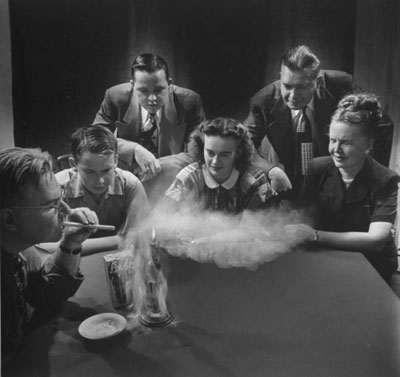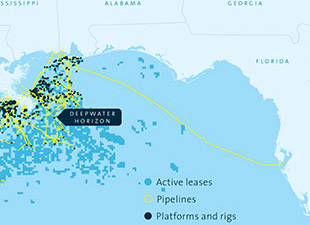
Even as a new story develops around the explosion on the Mariner Energy platform off the Louisiana coast, the BP story remains highly volatile. Here are a few bubbling highlights. Plus, elsewhere in the news from science, some interesting developments on the relationship between war and Alzheimer’s dementia, a 2,000-year-old case of mixing beer with antibiotics, the risks of flying in the developing world, plus a woman with a mysterious nocturnally-erasing memory.
- Officials from the Mississippi Department of Marine Resources took oyster fishermen out on the reefs off the Pass Christian Harbor yesterday, where they had earlier dredged and pulled up catches with 80 to 90 percent of the oysters dead, reports the Miami Herald. Oyster season typically begins in September or October.
- A UC Santa Barbara scientist has come up with a new way of predicting how contaminants like oil will spread. Igor Mezic, a professor of mechanical engineering at UC Santa Barbara, and his colleagues successfully predicted where and when oil washed ashore in the Mississippi River Delta and later, on the white-sand beaches of Pensacola, Florida. Their predictions were accurate to within a couple of miles of the actual spill later assessed by from aerial surveys. Mezic’s approach to the problem is based on computations describing how slicks of oil tend to be stretched into filaments by motion at the sea surface, and on incorporating forecasts of sea surface conditions from a US Navy model.The paper’s published online at Science.
- A chemical analysis of the bones of ancient Nubians shows that they were regularly consuming tetracycline, most likely in their beer (the real key to near-eternal life?). This is the strongest evidence yet that the art of making antibiotics, which officially dates to the discovery of penicillin in 1928, was common practice nearly 2,000 years ago. Read more in the paper at the American Journal of Physical Anthropology.
- A new paper in the Journal of the American Geriatrics Society finds that combat veterans with post-traumatic stress disorder (PTSD) have a greater risk for dementia than veterans without PTSD, even those who suffered traumatic injuries during combat. The difference doubles the risk that PTSD-sufferers will suffer a dementia diagnosis. “Although we cannot at this time determine the cause for this increased risk, it is essential to determine whether the risk of dementia can be reduced by effectively treating PTSD. This could have enormous implications for Veterans now returning from Iraq and Afghanistan,” says senior author, Mark Kunik, a psychiatrist at the Michael E. DeBakey VA Medical Center, Texas, USA.
- Taking a flight in the developing world runs you 13 times the risk of being killed in an air accident as taking a flight in the developed world. The more economically advanced countries in the Developing World (e.g., Taiwan, India, and Brazil) have better overall safety records than the others, but even their death risk per flight is seven times as high as that in the developed world. This according to a new paper in Transportation Science.
- Psychologists have documented what they believe to be a first-ever known case of a woman whose memory of new material is erased each night as she sleeps. She’s been having this problem ever since a car wreck in 2005. Reminsicent of the film 50 First Dates. But worse, probably. The paper’s in Neuropschologia. HT Research Digest Blog.















